Disease-Fighting Plants: 7 Delicious Herbs that Pack a Powerful Antimicrobial Punch
by www.SixWise.com
Adding herbs to your favorite dishes adds flavor, variety
and color. Antimicrobial herbs provide all of that - PLUS
they give your health a major boost.
Antimicrobial herbs have a unique ability to destroy and
inhibit the growth of disease-causing microorganisms. This
takes major stress off of your immune system, helping to stimulate
it and thereby helping you to fight off a wide array of potential
infections.
Antimicrobial herbs are capable of taking on a large variety
of microorganisms, such as:
-
Bacteria
-
Mold
-
Parasites
-
Viruses
-
Yeasts
-
Other living organisms
You may already be familiar with the following antimicrobial
herbs, but their potent disease-fighting properties may surprise
you. We recommend they be added generously to your cooking!
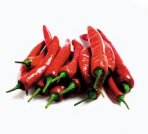 1.
Chili Peppers
1.
Chili Peppers
Chili peppers contain a substance called capsaicin, which
is what makes them so spicy (the spicier the pepper, the more
capsaicin it contains). Capsaicin is also an anti-inflammatory
compound that helps with pain relief and many other ailments.
Contrary to popular belief, chili peppers do not cause stomach
ulcers. In fact, they help prevent them by killing bacteria
you eat. They also contain vitamins C and A, which boost immunity
and help fight off potential pathogens.
Did you know? Capsaicin is mostly in the chili
pepper's seeds and white inner membranes. Taking these out
will remove some of the pepper's heat, but it will remove
some of its healing properties as well.
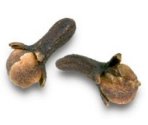 2.
Clove
2.
Clove
The active compound in cloves, eugenol, combines with other
clove components to make this pungent spice highly anti-bacterial.
It's also anti-inflammatory and the compound has been studied
for use in preventing:
Because clove extracts are anti-bacterial (and provide a
mild anaesthetic), they're used in the United States for dental
procedures like root canal therapy and temporary fillings.
They're also used in some sore throat sprays and mouth washes.
Did you know? Cloves are an excellent source
of traditional nutrients too, including omega-3 fatty acids,
dietary fiber, vitamin C and magnesium.
 3.
Garlic
3.
Garlic
Allicin, one of garlic's healthy compounds (and the one that
gives it its odor), has powerful antibacterial and antiviral
properties. When combined with the vitamin C in garlic, these
compounds kill harmful microbes and fight diseases including:
-
Cold and flu
-
Stomach viruses
-
Candida yeast
-
Tuberculosis
-
Botulism
Garlic is also a potent antibiotic, fighting a wide range
of pathogens, and studies show it even appears to fight antibiotic-resistant
strains of bacteria.
Did you know? Along with being able to lower
blood pressure, insulin and triglycerides, allicin may also
help prevent weight gain. A study on rats -- published in
the December 2003 issue of the American Journal of Hypertension
-- found that rats' weights remained stable or decreased slightly
when allicin was given along with a sugar-rich diet, while
other rats' weights increased.
 4.
Mustard Seed
4.
Mustard Seed
Researchers from the University of Manitoba in Winnipeg,
Canada found that the antimicrobial properties of mustard
seed are so strong that when powdered
mustard was added to hamburger meat, it killed E. coli bacteria.
The compound responsible for this effect is allyl isothiocyanate.
The U.S. Department of Agriculture reported that this potent
compound can fight off not only E. coli but also listeria,
Staphylococcus aureus and other foodborne pathogens.
Unfortunately, prepared mustard that is typically consumed
in the United States does not contain this healthy component.
Did you know? Isothiocyanates in mustard
seed have also been studied for their ability to inhibit the
growth of existing cancer cells and protect against the formation
of new ones.
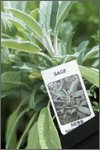 5.
Sage
5.
Sage
Sage is a powerful antimicrobial that is known to kill fungi,
including candida albicans, and other microbes such as salmonella.
Sage leaf extract is also known to kill the microbe that causes
gingivitis.
Sage is an anti-inflammatory and antioxidant. It contains
flavonoids, phenolic acids and oxygen-handling enzymes, all
of which give it a unique ability to prevent oxygen-based
damage to cells. Sage may be useful in fighting rheumatoid
arthritis and other inflammatory conditions, bronchial asthma
and atherosclerosis.
Did you know? Sage is also good for your brain.
A study in the June 2003 Pharmacological Biochemical Behavior
found that people given sage essential oil extracts had significantly
improved recall abilities compared to those given a placebo.
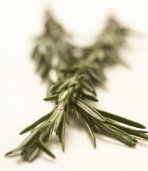 6.
Rosemary
6.
Rosemary
Rosemary has both antibacterial and antifungal properties
and is sometimes recommended to treat yeast overgrowth in
the intestines.
Further, it is known to stimulate the immune system, increase
circulation and improve digestion.
Did you know? Rosemary has been traditionally
regarded as a memory enhancer. Students in ancient Greece,
for instance, would put sprigs of the herb in their hair while
studying.
7. Thyme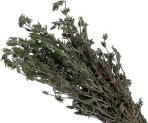
Thyme contains volatile oil components that are known to
fight a wide range of bacteria and fungi, including:
-
Staphalococcus aureus
-
Bacillus subtilis
-
E. coli
-
Shigella sonnei
Recent studies have also shown that thyme can help prevent
foods from becoming contaminated and even help decontaminate
already contaminated foods. A study in the February 2004 issue
of Food Microbiology found that thyme essential oil decontaminated
lettuce contaminated with Shigella, an infectious organism
that can cause diarrhea and intestinal damage.
Washing produce in a solution of just 1 percent thyme essential
oil was also able to decrease the number of Shigella bacteria
to undetectable levels.
Did you know? Thyme has been used for
its antiseptic properties since the 16th century, both in
mouthwashes and topically.
Recommended Reading
Eight
Key Nutrients to Help Prevent Breast Cancer -- and Where to
Find Them
Eight
Healthy & Delicious Foods that Will Provide You a Major
Energy Kick
Sources
The
World's Healthiest Foods
Whole
Health MD
Eating
Safely in a Polluted World